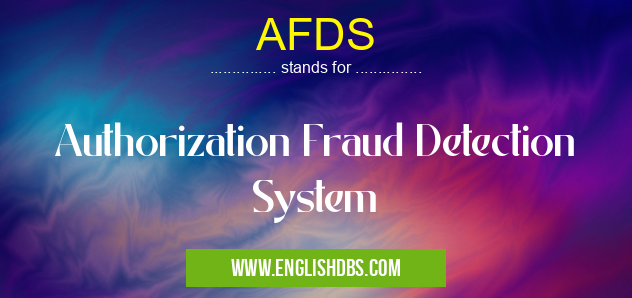What does AFDS mean in UNCLASSIFIED
Authorization Fraud Detection System (AFDS) is a critical tool used to combat unauthorized transactions and protect financial institutions and their customers from fraudulent activities.

AFDS meaning in Unclassified in Miscellaneous
AFDS mostly used in an acronym Unclassified in Category Miscellaneous that means Authorization Fraud Detection System
Shorthand: AFDS,
Full Form: Authorization Fraud Detection System
For more information of "Authorization Fraud Detection System", see the section below.
What is AFDS?
AFDS is a system designed to analyze and identify suspicious payment transactions in real-time by utilizing advanced algorithms and data analytics techniques. It monitors and evaluates various factors, including transaction patterns, account behavior, and device characteristics, to determine the risk of fraudulence.
How AFDS Works
AFDS operates through a series of steps:
- Data Collection and Analysis: AFDS collects data from various sources, such as transaction logs, account information, and device data. It analyzes this data to establish normal usage patterns and identify anomalies.
- Fraud Detection: Based on the collected data, AFDS evaluates transactions against established risk parameters and rules. Suspicious transactions that deviate from normal behavior are flagged for further investigation.
- Alert Generation: When potential fraud is detected, AFDS generates alerts and notifies the relevant parties, such as the card issuer, merchant, or customer.
- Decision-Making: Upon receiving an alert, financial institutions review the flagged transactions and make decisions regarding approval or denial. They may also initiate additional verification steps or request further information from the customer.
Benefits of AFDS
- Reduced Fraud Losses: AFDS helps financial institutions prevent unauthorized transactions and minimize financial losses associated with fraud.
- Improved Customer Protection: AFDS safeguards customers from fraudulent activities, protecting their accounts and personal information.
- Enhanced Transaction Monitoring: AFDS provides continuous monitoring of transactions, allowing for timely identification and mitigation of fraudulent attempts.
- Automated Decision-Making: AFDS automates the process of fraud detection, reducing the workload of fraud analysts and improving efficiency.
Essential Questions and Answers on Authorization Fraud Detection System in "MISCELLANEOUS»UNFILED"
What is an Authorization Fraud Detection System (AFDS)?
An AFDS is a system designed to detect and prevent fraudulent transactions by analyzing authorization requests in real-time. It uses various techniques to assess the risk of each transaction and make a decision to approve, decline, or review the transaction.
How does an AFDS work?
An AFDS typically uses a combination of rule-based and machine learning algorithms to analyze transaction data. Rule-based algorithms evaluate transactions against predefined criteria, while machine learning algorithms learn from historical data to identify patterns and anomalies associated with fraud.
What are the benefits of using an AFDS?
Using an AFDS can provide several benefits, including:
- Reduced fraud losses
- Improved customer experience by preventing fraudulent transactions
- Increased compliance with industry regulations
- Enhanced operational efficiency by automating fraud detection and prevention tasks
What types of transactions can an AFDS monitor?
An AFDS can monitor various types of transactions, including:
- Card-present transactions
- Card-not-present transactions
- Mobile payments
- Online banking transactions
How can I implement an AFDS?
Implementing an AFDS typically involves the following steps:
- Define your fraud detection requirements
- Select a vendor that provides an AFDS solution
- Integrate the AFDS with your existing systems
- Train your team on the use of the AFDS
- Monitor and adjust the AFDS as needed
What are the challenges of using an AFDS?
Some challenges associated with using an AFDS include:
- Balancing fraud detection with customer convenience
- Keeping up with evolving fraud techniques
- Managing false positives and false negatives
How can I evaluate the effectiveness of my AFDS?
To evaluate the effectiveness of your AFDS, you should monitor key metrics such as:
- Fraud detection rate
- False positive rate
- False negative rate
- Customer satisfaction
Final Words: AFDS plays a vital role in the fight against authorization fraud. By leveraging advanced analytics and data-driven insights, it empowers financial institutions to detect and prevent fraudulent transactions, protect customers, and maintain the integrity of the payment system.
AFDS also stands for: |
|
| All stands for AFDS |
